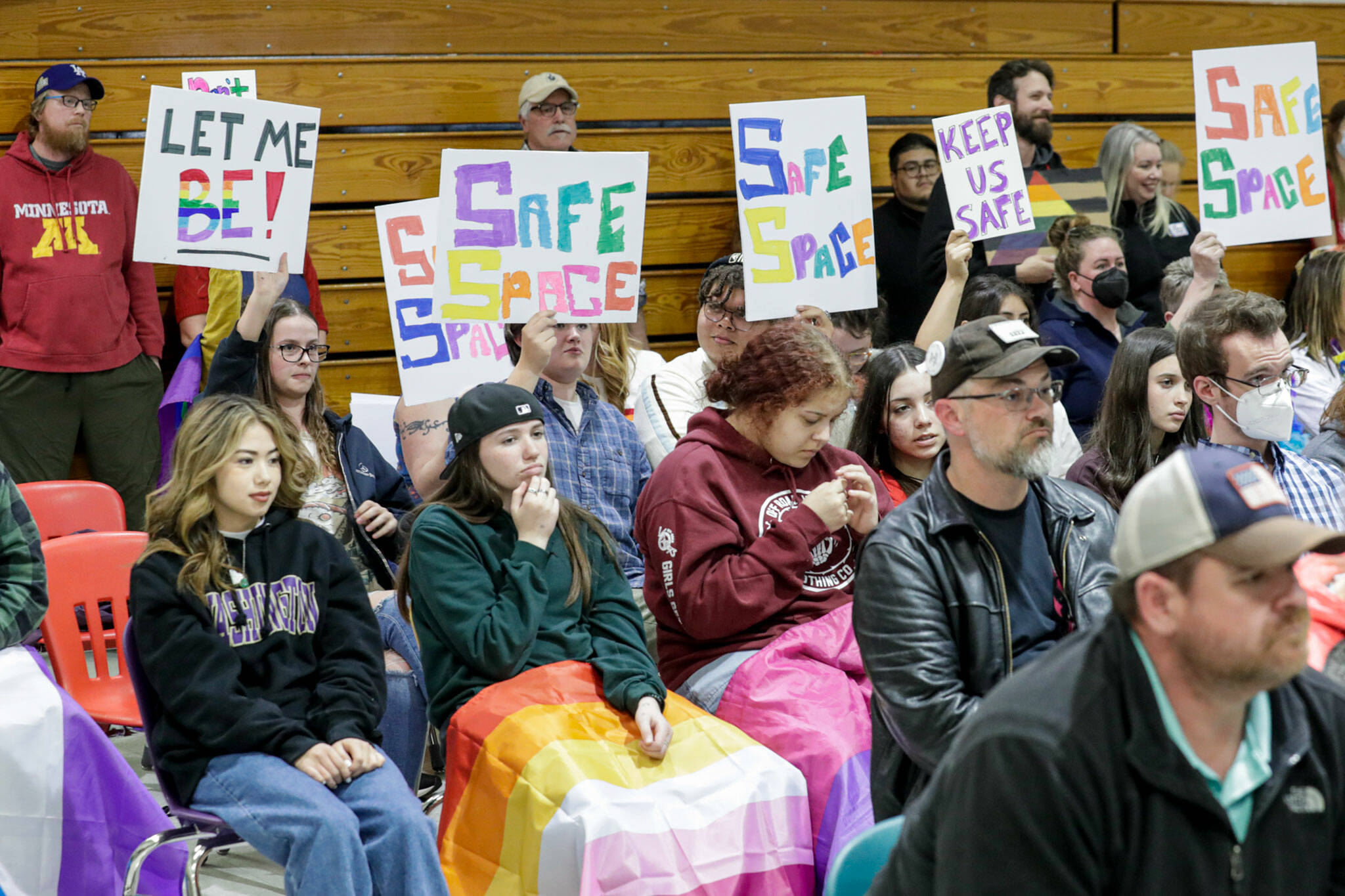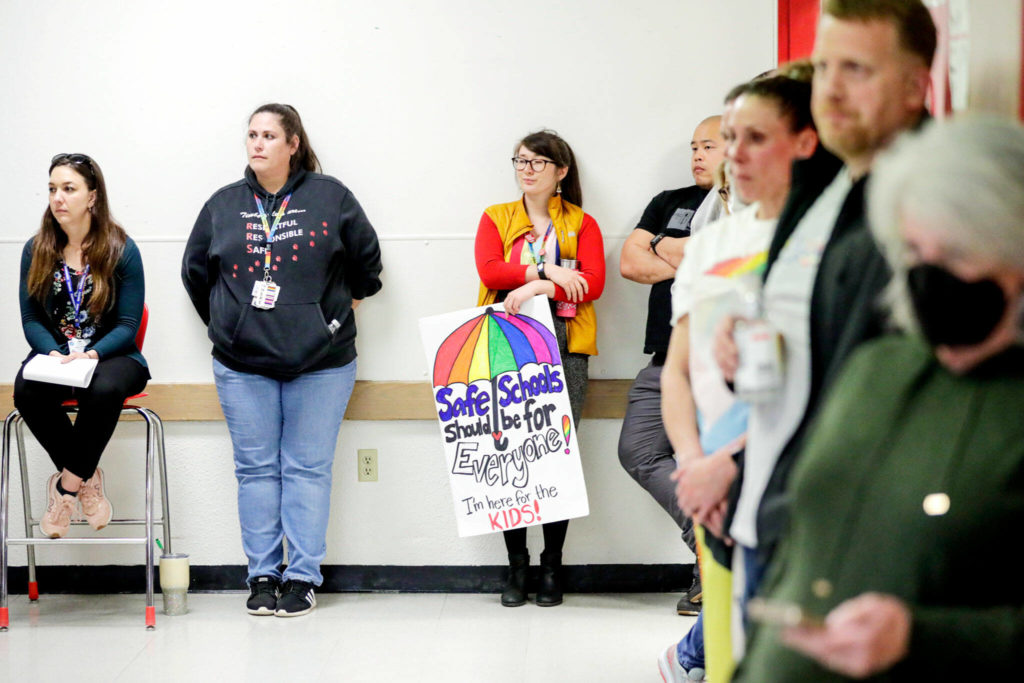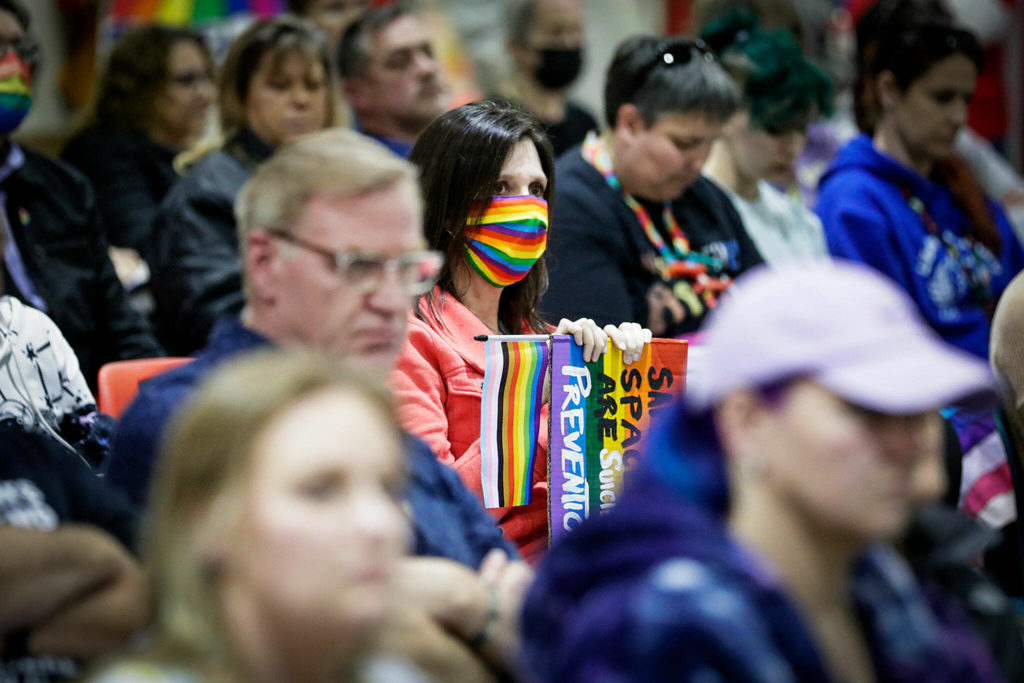MARYSVILLE — Leaders of Marysville public schools got an earful Monday night on their controversial proposal to require students get their parents’ permission to join any club, then moved a step closer to enacting the policy next month.
For nearly two hours, the Marysville School District Board of Directors listened to supporters praise the policy as an emboldening of parental rights, while critics denounced it as an oblique attack on LGBTQ groups.
Directors then voted 4-1 to revise the proposed policy so it is limited to students in elementary and middle schools and not high schools. Director Katie Jackson dissented. The board teed up for a final vote June 6, though it may not act that day.
“We have to protect rights. That’s our job,” said director Wade Rinehardt, one of three board members pushing the change. “We have to protect parents’ rights. We have to protect students’ rights. We are not going to adopt anything today. We will think about it.”
Board president Paul Galovin, who backed Monday’s revision but opposes the policy, wondered if the edit is as far as the majority will go.
“I don’t consider that a win. I consider it a chance to talk,” he said. “I really hope we do resolve this in a different way. What I’m not certain of after tonight is where the conversation goes.”
Current district policy sets rules on forming and operating student clubs. It gives wide berth for students to involve themselves in clubs of their choosing, without needing a parent or guardian to approve their choices.
And there are a lot of groups to choose from.
At Marysville-Getchell High School, for example, there are clubs for auto aficionados and Lego fans. There’s one focused on conflict resolution and separate affinity groups for students of color, like the Black Student Union and the Native American and Friends Club.
At issue are policy changes to start requiring parental consent for all non-curriculum and co-curricular student groups. In practice, that could mean students would need a parent to sign a permission slip to attend clubs before or after school.
Critics contend the board’s new conservative majority of directors Rinehardt, Connor Krebbs and Keira Atchley developed the change to impede access to clubs for LGBTQ students and students with LGBTQ families at several Marysville elementary schools.
The clubs are intended to provide a supportive and safe space for students to hang out once a week before school.
Some parents and board members have said they are worried there is limited parental oversight and that elementary-age children are too young to discuss sexuality.
Directors met Monday in front of a boisterous crowd of parents and students that filled the cafeteria at Cedarcrest Middle School.
Passions ran high, stoked by speakers’ strong words and partisan applause. Several times Galovin warned audience members to “be respectful” or risk him ending comment.
Supporters like Tim Thometz, Susan Kasch and Ralph Dufresne delivered a simple message: Parents, not teachers or school administrators, must decide which activities their children are allowed to participate in. But right now parents feel locked out of the process, they said.
“This policy is fair, reasonable and equitable,” Thometz said. Rejecting it “would diminish the rights of parents.”
Nearly twice as many spoke in opposition. Their ranks included former school board member Vanessa Edwards, state Sen. June Robinson, D-Everett and several students.
Thirty-three parents, staff, students and Marysville residents signed up to speak.
One of those was James DeLeon, who attends Marysville-Getchell High School. There, he founded the Asian and Pacific Islander student union, and will be the associated student body president in the fall.
DeLeon said through participating in clubs, students develop confidence, build character and find a comfortable place to hang out with peers. Clubs are spaces where they feel safe — vitally important for those who are dealing with issues of sexuality and fear getting outed.
He called the proposed policy “harsh” and “hurtful” and said it would create a less safe environment for many students.
“Our students are old enough to make their own decisions,” he said. “Please let’s all work together to make our students safer.”
Incoming Superintendent Zachary Robbins was at Monday’s meeting, but did not speak.
With this policy, the trio of conservative board members finds itself aligned with a supportive political base of parents and community members, and at odds with many students, teachers and district leadership.
Interim Superintendent Chris Pearson publicly expressed reservations with the policy for the first time on Monday. He urged directors to table it.
He recommended directors spend time with club advisors and solicit insights from legal and policy experts of the Washington State School District Directors Association.
Meanwhile, Superintendent of Public Instruction Chris Reykdal opposes the policy and has encouraged the district to rethink its course of action.
“If the school board makes this change — which is unprecedented in our state, from what we know — it will likely have a chilling effect on the ability of many extracurricular activities to be a safe place for many students,” Katy Payne, a spokeswoman for Reykdal, wrote in an email.
“It’s important to make clear that, given the timing and sequence of events leading to this particular policy revision, the policy could be construed as discriminatory, even if the policy at hand seems neutral on its face and applies equally to everyone,” she wrote.
There is a difference of opinion on the legality of requiring parental consent.
Jackson said such policies “might be illegal” and have been challenged elsewhere as violations of students’ constitutional right to equal protection and privacy.
“Bottom line is how many children is this going to hurt,” she said.
Krebbs said that he, Rinehardt and Pearson met with the school district’s attorney and was told the proposed policy will pass muster.
“I want to work together on this. We truly do want to hear from the community on solutions,” he said. “That is my hope for the weeks leading up to June 6.”
Reporter Isabella Breda contributed to this story.
Jerry Cornfield: 360-352-8623; jcornfield@heraldnet.com; Twitter: @dospueblos.
Talk to us
> Give us your news tips.
> Send us a letter to the editor.
> More Herald contact information.



























